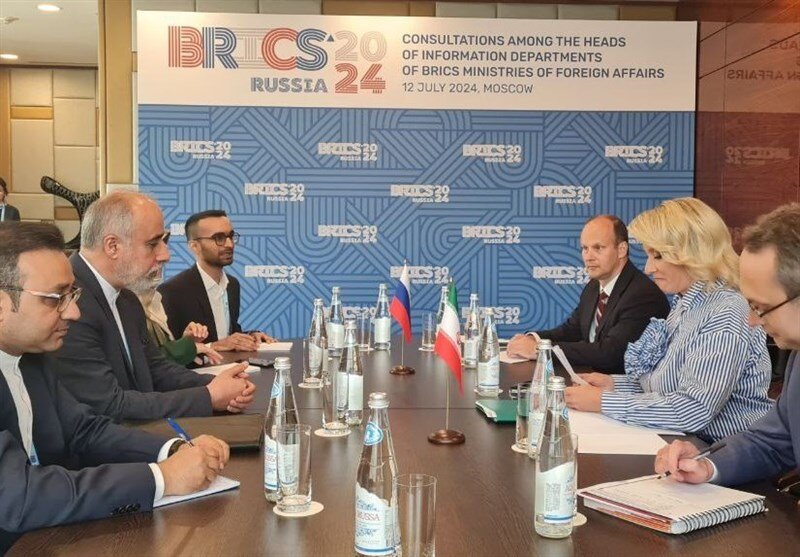Tehran, Moscow reiterate desire to strengthen bilateral relations

TEHRAN – Nasser Kanaani, spokesperson and head of the Public Diplomacy Center of Iran’s Foreign Ministry, has reiterated the importance of deepening bilateral ties in a meeting with Maria Zakharova, the director of the Information and Press Department of the Ministry of Foreign Affairs of Russia.
The meeting occurred on the sidelines of the BRICS spokespersons' meeting in Moscow on Friday.
The discussions between Kanaani and Zakharova focused on enhancing the friendly and constructive relations between Iran and Russia. They delved into various aspects of their bilateral relationship, highlighting the importance of strengthening media cooperation, advancing public diplomacy, and fostering cultural exchanges.
Both sides expressed their commitment to building on the strong foundation of their ties and exploring new avenues for collaboration.
Kanaani emphasized the vital role of media in shaping public opinion and the necessity of accurate and unbiased reporting. He proposed initiatives to facilitate greater media interaction and cooperation between Iran and Russia. Zakharova, in turn, underscored the significance of public diplomacy and cultural exchanges in deepening mutual understanding and friendship between the two nations.
The meeting comes at a time when the Russian Federation, as the current chair of BRICS, is actively hosting a series of diverse events. These events, covering a wide range of topics, are aimed at bringing together officials from member countries to consult on expanding comprehensive cooperation among BRICS nations. The discussions between Iran and Russia are seen as a crucial step towards achieving these broader goals.
As both countries navigate complex international landscapes, the commitment to bolstering media collaboration and cultural ties signifies a strategic effort to enhance their global influence and promote a multipolar world.
The meeting between Kanaani and Zakharova marks a continuation of the ongoing dialogue and partnership between Iran and Russia, reaffirming their dedication to working closely together in various domains.
Iran, Brazil hold diplomatic talks on cooperation
In another significant diplomatic engagement, Kanaani also met with his Brazilian counterpart, Joel Sampaio, on the sidelines of the BRICS Spokespersons and Heads of Information Centers meeting in Moscow.
During their discussion, Kanaani and Sampaio explored the potential for cooperation between Iran and Brazil in the areas of culture, media, and public diplomacy. Both sides emphasized the importance of leveraging opportunities to enhance bilateral relations and to further develop ties within the BRICS framework.
In a gesture of solidarity, Joel Sampaio expressed his condolences to Kanaani for the tragic death of President Ebrahim Raisi and Foreign Minister Hossein Amir Abdollahian. He reiterated Brazil’s commitment to strengthening cooperation with Iran in this new era, signaling readiness to collaborate across various sectors.
This meeting underscores the ongoing efforts by BRICS member countries to deepen their partnerships and underscores the potential for expanded collaboration in multiple fields.
Ethiopian, Iranian Foreign Ministry Spokespersons discuss strengthening ties
Nebu Tedla, spokesperson for the Ethiopian Ministry of Foreign Affairs, held a meeting with Nasser Kanaani, spokesperson and head of the Public Diplomacy Center of Iran’s Ministry of Foreign Affairs, on the sidelines of the BRICS Spokespersons' Summit in Moscow. The discussion focused on enhancing bilateral cooperation and addressing shared concerns.
Tedla highlighted the critical need for stronger collaboration to combat fake news and disinformation campaigns targeting nations such as Iran, Russia, and Ethiopia. He emphasized the importance of joint efforts to develop effective strategies in this area.
During the meeting, Tedla expressed criticism of Western countries for their manipulative use of human rights and related international structures to serve their own interests.
Kanaani, echoing these sentiments, stressed the significance of unified efforts among BRICS member countries to counteract media hate and disinformation aimed at discrediting independent nations. He called for increased cooperation to challenge the selective and instrumental use of human rights and accusations of terrorism by some Western countries to pursue illegitimate political objectives.
This meeting underscores the ongoing dialogue and partnership between Ethiopia and Iran, reflecting a mutual commitment to addressing common challenges and strengthening their bilateral ties within the broader BRICS framework.
Kanaani emphasizes neighborly relations in meeting with Emirati counterpart
Continuing his meetings, Kanaani also engaged in discussions with Afra Al-Khamli, counterpart and head of the Strategic Relations Center at the UAE Ministry of Foreign Affairs, on the sidelines of the BRICS summit.
The meeting focused on reinforcing bilateral achievements and enhancing cultural, media, and people-to-people connections between Iran and the UAE. Kanaani highlighted recent statements from Iran's President-elect, Masoud Pezeshkian, underscoring the prioritization of neighborly relations in Iran's new government's foreign policy. He expressed optimism that relations with neighboring countries, including the UAE, would flourish during Pezeshkian's tenure.
Kanaani traveled to Russia to participate in the event, titled ‘consultations among the heads of information departments of BRICS Ministries of Foreign Affairs’, which was held in Russia’s capital on July 12.
Russia, as the rotating president of the BRICS, will hold various events in 2024 on a range of subjects and host officials from the bloc’s member states for talks on promoting and expanding cooperation among the BRICS countries.
The BRICS group is a political-economic coalition focused on coordinating major and complex global economic issues. The first BRICS summit was held in 2009 in Yekaterinburg, Russia, with the participation of China, Russia, Brazil, and India. South Africa joined the coalition in 2010, changing the group's name from BRIC to BRICS. Over the past fifteen years, BRICS has become an important coalition of rapidly growing economies and a leading force among countries in challenging global economic and financial systems.
